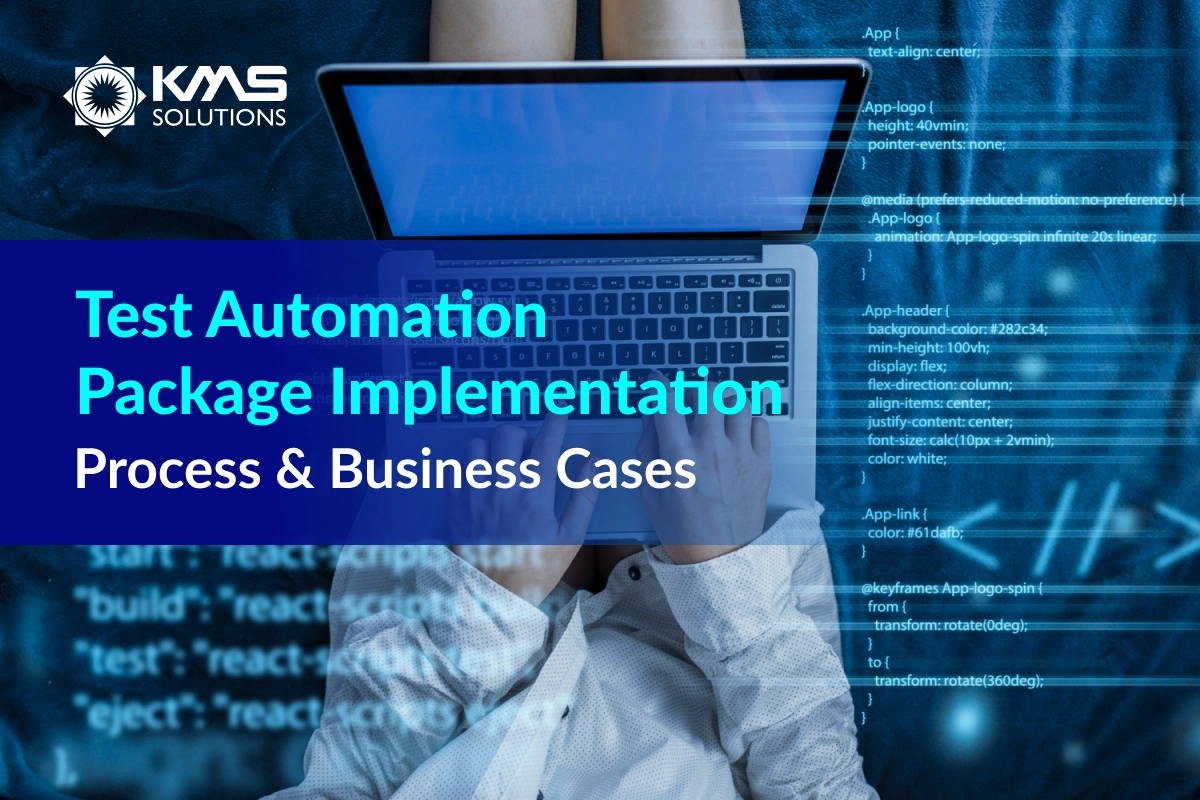The banking and financial services sector is in the midst of a digital evolution. Customers expect secure, always-on services across different platforms, while regulators demand ever-stricter compliance. These pressures put a heavy burden on the IT departments of banks, particularly quality assurance (QA) teams.
Many BFSI companies have come up with test automation packages that were especially personalized for banks to get a structured, scalable solution with pre-built assets, reusable components, and support for common banking workflows. This article explores the structured process of implementing a test automation package in banking, showcases real-world business cases, and outlines best practices to ensure a successful transformation.
Key Steps in Implementing a Test Automation Package in Banking
Applying a test automation package in banking involves a structured, multi-phase process that ensures alignment with both technical and business goals. Here’s a step-by-step guide to effectively integrating such a package into your banking operations:
1. Assess the Current Testing Demands
Begin by conducting a comprehensive evaluation of the bank’s existing quality assurance (QA) processes. This includes:
- Evaluate existing QA processes, toolsets, and workflows
- Identify testing cycles and bottlenecks (e.g., long regression windows, frequent defects in production)
- Review test case coverage across key systems
- Evaluate team skills and toolset compatibility
- Define key pain points and business drivers for automation
2. Define Scope and Objectives
With a clear understanding of current testing challenges, establish the scope and goals for the automation initiative:
- Prioritization of Test Cases: Focus on automating high-risk, repetitive, and time-intensive test cases that are critical to banking operations, such as user authentication, fund transfers, and loan processing.
- Objective Setting: Define clear objectives, such as reducing regression testing time by a specific percentage, enhancing test coverage, or improving defect detection rates.
- Implementation Strategy: Decide between a phased rollout, starting with a pilot project, or a full-scale implementation, based on the bank’s readiness and resources.
This strategic planning ensures that the automation efforts are targeted and measurable, facilitating the demonstration of return on investment (ROI) to stakeholders.
Choosing a test automation package that aligns with the bank’s technological ecosystem and business needs is critical. Factors to consider in a comprehensive test automation package include types of testing coverage, integration capabilities, scalability, and flexibility.
KMS Solutions offers tailored test automation service packages designed to meet the diverse needs of financial institutions:
- KickStart Package: Ideal for banks initiating their automation journey, this package provides a quick setup with pre-configured frameworks and training for in-house teams, enabling rapid deployment of automated tests.
- Accelerate Package: Suited for larger banks requiring continuous and scalable automation, this package offers ongoing support and the implementation of a comprehensive suite of automated test cases.
Selecting the right package ensures that the bank leverages a solution aligned with its operational scale and strategic objectives.
4. Customize and Configure the Package
Since every bank has unique workflows and systems, your chosen test automation package should align with your specific business processes. This involves tailoring test scripts to match your applications, configuring integrations with existing systems, and setting up secure test data management practices to protect sensitive information.
5. Execute Tests, Analyze Results and Optimize Automation
Initiate automated test runs, focusing on critical functionalities first. Monitor test outcomes using real-time dashboards and detailed reports. Analyze these results to identify areas of improvement, track progress against set objectives, and ensure that the automation efforts are yielding the desired outcomes.
Moreover, as automation is an ongoing journey, regularly reviewing and updating test scripts to accommodate changes in financial software is important. Expand automation coverage to include performance, security, and API testing. Incorporate AI-powered features, such as self-healing scripts, to enhance resilience and reduce maintenance efforts.
Real Use Cases for Successfully Adopting Test Automation Packages in Bank
Below are real-world-inspired business cases that illustrate how banks have successfully implemented test automation packages to drive efficiency and innovation.
Use Case 1: Boosting Software Testing Process to Handle the Challenges of Growing Mobile Users in TPBank
TPBank, one of Vietnam’s leading digital banks, operates a complex and dynamic technology ecosystem. However, the intricacy of its systems had presented considerable challenges for the internal QA team, particularly in maintaining comprehensive, high-quality testing coverage. Limited automation, incomplete workflows, and a lack of CI integration were affecting both speed and consistency in testing.
To overcome these obstacles, TPBank partnered with KMS Solutions to adopt a test automation service package that includes
- Automated scripts for different operating systems and environments
- Seamless integration with Jenkins
- CI/CD implementation
- Comprehensive training programs covering both fundamental and advanced testing concepts.
The outcome was an overall implementation timeline reduced from 3 months to just 2 months, helping TPBank accelerate their automation roadmap while ensuring high-quality software releases. The TPBank’s QA team also gained sufficient knowledge about the Katalon Studio testing tool within just two weeks of training.
Use Case 2: HDBank Embraces Test Automation Package from KMS to Elevate QA Efficiency
As part of its digital transformation journey, HDBank recognized that manual testing was becoming a major bottleneck—both in terms of time and testing quality. The existing acceptance and QA processes were no longer sufficient to meet the pace and demands of modern software delivery. Seeking a scalable and efficient solution, HDBank turned to KMS Solutions for a complete automation package designed specifically for the bank’s demands:
- Katalon Studio full licenses
- An in-depth training program built around six representative test cases to help the QA team grasp both the fundamentals and practical aspects of test automation.
- Detailed test scenarios and configure initial test scripts, ensuring a smooth onboarding and immediate application of knowledge.
Within three months, HDBank’s QA team can possess all the essential skills to proficiently create scenarios and conduct automated tests. Moreover, the bank can improve the current testing process in terms of quality and time efficiency, laying a solid foundation for scaling test automation across future projects.
Best Practices for Successful Implementation
- Align Automation with Business Goals
Automation should not be a siloed technical initiative. Start by aligning automation outcomes (speed, accuracy, and cost-efficiency) with broader business goals such as improving customer satisfaction by delivering faster, bug-free digital experiences or enhancing risk management by ensuring consistent compliance checks across all releases.
- Start Small and Iterate
Instead of aiming for full-scale automation initially, begin with a targeted pilot on a single product or a high-impact workflow—such as online banking login, transaction processing, or loan application journeys. Use results to refine strategy and build internal momentum before expanding to broader portfolios.
- Adopt a Modular and Data-Driven Approach
One of the biggest challenges in test automation is maintaining long-term scalability. That’s where modularity and data-driven testing come into play:
- Modular test design breaks down tests into reusable components (e.g., login, search, transaction), making them easier to maintain and adapt.
- Data-driven testing allows teams to use external data sets to run the same test with multiple data inputs, covering edge cases, validations, and different regulatory scenarios efficiently.
This approach minimizes script duplication, enhances maintainability, and enables higher coverage with fewer resources.
- Ensure Continuous Integration
Integrating test automation into your CI/CD pipeline is key to achieving true agility in software delivery. It allows your team to automatically trigger tests on every code commit, pull request, or build. Tools like Jenkins, Azure DevOps, or GitHub Actions can be paired with automation platforms like Katalon or Selenium to create fully automated pipelines that support fast and safe releases.
- Measure and Improve
To prove the value of automation and continuously refine your strategy, it’s essential to track and report meaningful KPIs:
- Test execution time saved per sprint or release
- Number of bugs caught pre- vs. post-deployment
- Reduction in compliance-related errors
- Increase in overall test coverage over time
By embedding these best practices into your implementation roadmap, your test automation package becomes more than just a technical tool—it becomes a strategic asset that enhances speed, quality, compliance, and customer trust in every digital interaction.
Start with the Right Test Automation Package in Banking
For modern banks, implementing test automation packages is not just about improving testing speed—it’s about enabling transformation. By following a structured approach—assessing needs, selecting the right package, customizing for the environment, and continuously optimizing—banks can turn test automation into a strategic advantage.
KMS Solutions’ Test Automation Package is designed to help banks leverage the full power of test automation and accelerate the testing process effectively. As demonstrated in success stories from TPBank and HDBank, we help financial institutions overcome testing bottlenecks and enhance overall software quality—while reducing risk and cost.
Whether you’re just beginning your automation journey or looking to optimize existing efforts, KMS Solutions offers the expertise and support needed to turn your test automation goals into measurable business outcomes. Reach out to us now for the limited-time test automation package offers!











